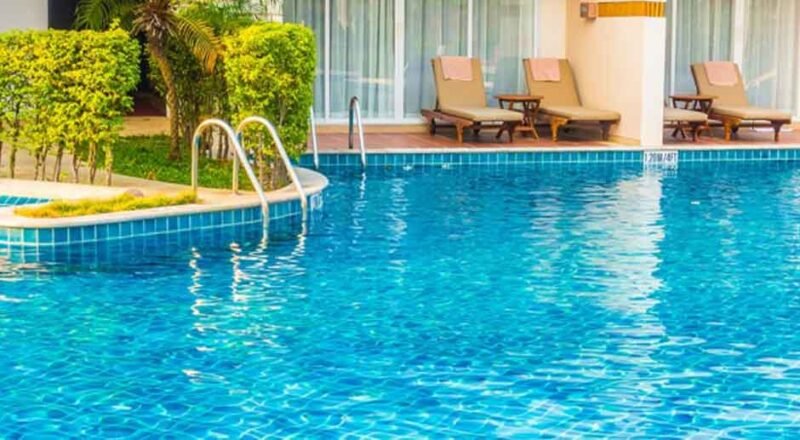
Designing your perfect backyard pool is a big task. You need to think about the pool’s shape, size, cost, and what it’s made of. Nowadays, you also need to decide the type of water. Every pool requires a way to keep the water clean, and this usually involves using chlorine, salt, or some other type of sanitising agent. Even innovative systems like the Naked Freshwater System use a small amount of chlorine. If you are unsure about choosing a chlorine pool, you are not alone. Keep reading my article to determine the differences between these pool types, which will help you decide which option is the right choice for you.
Chlorine Pools
Chlorine-based swimming pools depend on a precise chemical equilibrium to sanitise and purify the pool water. After obtaining a water sample, adjustments to chlorine levels can be made using either liquid or tablets. Moreover, it is essential to adjust alkalinity, calcium hardness, and pH levels. On the plus side, chlorine is an effective disinfectant that reacts with the pool water, generating hypochlorous acid, which effectively eliminates bacteria and prevents the growth of algae and mould. They are relatively inexpensive compared to other pool sanitising methods. Maintaining proper chlorine levels is easy with regular testing and chemical additions.
However, there are some drawbacks to chlorine pools. They can irritate eyes and dry out the skin and hair. They emit a strong chemical odour and have the potential to form chloramines when chlorine reacts with sweat, skin cells, and other waste products, which may be unpleasant for some swimmers. Chlorine pools require the purchase of chlorine compounds for regular testing to uphold the recommended chemical levels. Moreover, the equipment used to add and circulate the chlorine needs periodic maintenance as well.
Saltwater Pools
Saltwater pools are a game-changer in the world of swimming pools. They operate on a simple principle: mixing regular pool water with added salt through a salt water chlorinator. This system converts salt into sodium and chlorine ions through an electrolysis process. This continuous magic act means you can say goodbye to the chore of constantly adding chemicals to keep your pool pristine and safe.
The real gem of saltwater pools is their ease of maintenance. Unlike their traditional counterparts, these pools don’t demand regular chlorination. Once you introduce salt into the system, it takes care of itself for extended periods, sparing you from frequent chemical checks and additions.
What’s even more fabulous is that the saltwater pools save time. Chlorine-based pools often need vigilant monitoring to ensure the water chemistry is just right. Saltwater pools, on the other hand, liberate you from frequent tests, which may save you time, money, and effort.
Beyond the practicalities, saltwater pools are a true blessing for your well-being. Conventional chlorine can sometimes be a villain, causing skin and eye irritation, and even aggravating asthma. Saltwater pools, however, are gentle souls. They pamper your skin and respiratory system, offering a swim that’s a true pleasure. Be warned about swimming for extended periods, it might result in those telltale red eyes.
Thinking about selling your home? Saltwater pools will likely attract more buyers. They are often willing to open their wallets a little wider for a home that has a saltwater pool. Why? Well, they are easy to maintain and allow a swim that’s kind to the skin.
Now, onto the not-so-sunny side. Saltwater pools do come with a hefty price tag upfront. Blame it on the electrolysis machine, which doesn’t come cheap. But for many, the long-term benefits and sheer joy of owning one make this initial investment worthwhile.
Saltwater pools convert salt into chlorine through a process called electrolysis. The salt content is much lower than ocean water, making these pools comfortable for swimming. Saltwater pools are gentler on skin, eyes, and hair compared to traditional chlorine pools. There is minimal chemical odour.
On the downside, saltwater pools have high upfront costs. The high cost of the electrolysis machine drives up the price.
Freshwater Pools
Freshwater pools use a filtration system without chlorine or salt to keep the water clean and clear. One popular method is an ozone purification system. Ozone effectively kills bacteria and pathogens without any chemical smell or irritation to the eyes or skin.
Freshwater pools have minimal long-term chemical costs. Once the filtration system is installed, maintenance is fairly straightforward without the daily or weekly addition of chemicals. There are also no caustic chemicals to store onsite.
However, the initial purchase price for the purification system can be high. Parts may need replacement over time as well. Without chlorine or salt, swimmers may notice more algae, mould, and biofilm accumulation, requiring scrubbing and filter cleaning. Testing water frequently is important to ensure it remains sanitary.
The Verdict
When choosing between the different pool types, consider your budget, maintenance preferences, and sensitivities to chemicals and odours. There is no doubt that freshwater pools are also gentler for swimmers, but saltwater pools are the best option. Speak with pool contractors to determine the best choice for your home and family’s needs. With proper care and maintenance, all three pool types can provide an enjoyable backyard oasis for relaxation, exercise, and entertainment. Evaluating both the pros and cons of each method will lead you to the ideal pool to install and enjoy for years to come.

